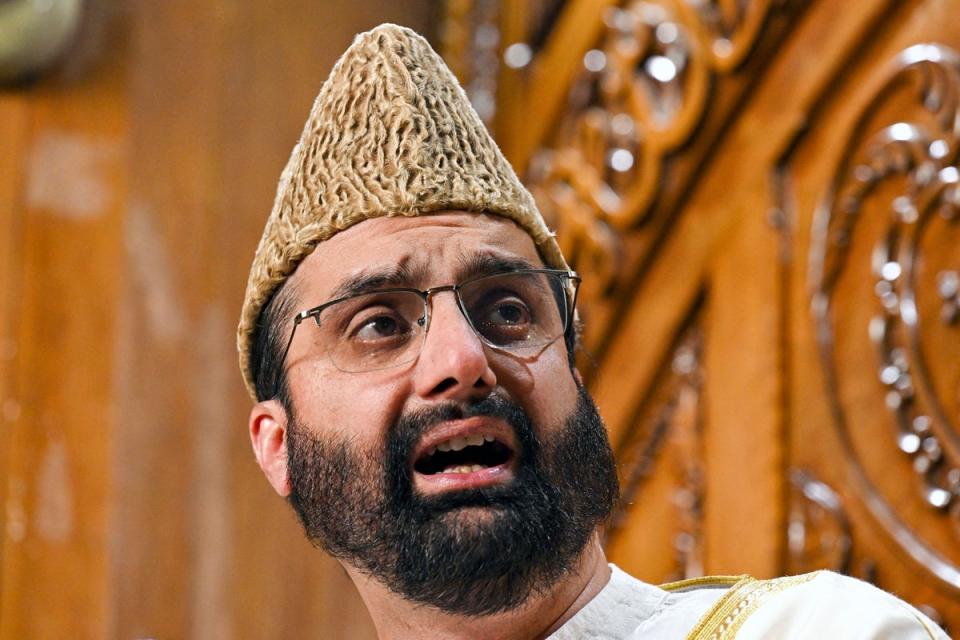Kashmiri Muslim cleric critical about India released after four years of house arrest

A Kashmiri separatist leader has been released from house arrest four years after he was detained by authorities following the Indian government’s revocation of the special status of Jammu and Kashmir.
Mirwaiz Umar Farooq offered Friday prayers at the historic Jamia Masjid in Srinagar and delivered an emotional sermon as he and other worshippers broke into tears.
His release from detention comes after the Jammu and Kashmir high court demanded a reply from lieutenant governor Manoj Sinha over Mr Farooq’s release.
Mr Farooq is the chair of the Hurriyat Conference, an umbrella group of almost two dozen separatist parties. He has been spearheading protests against Indian rule in the disputed region but is considered the most moderate among separatist leaders in Kashmir.
He was arrested on 4 August 2019 by India’s authorities and placed under house arrest later in his residence in Srinagar’s Nigeen area, his lawyer said in his petition to the court.
The arrest had come after India’s ruling Bhartiya Janata Party government revoked Article 370 in the Indian constitution. The law provided autonomy to the Jammu and Kashmir region and gave its people protections on land and jobs.
The region was downgraded into a union territory and came under the rule of the federal government.
Dozens of Kashmir leaders were placed under house arrest, a move New Delhi said was necessary to maintain law and order. Most leaders were released more than a year after restrictions such as internet bans were lifted.
The Kashmir valley has remained a disputed territory between India, Pakistan and to a lesser extent China, which all administrate parts of the region and claim others. People in the valley have led an armed insurgency against Indian rule since 1989 and India has blamed Pakistan for fuelling militancy in the region.

“Senior police officials visited the residence of Mirwaiz on Thursday to inform him that the authorities have decided to release him from house detention and allow him to go to Jamia Masjid for Friday prayers,” the mosque management committee said in a statement.
Scores of people gathered outside the mosque on Friday and Mr Farooq received a grand welcome, with people throwing flowers at him and cheering.
Videos from his sermon at the mosque showed Mr Farooq choking up as hundreds of people attended the prayers.
Mirwaiz Umar Farooq's emotional breakdown on Jamia Masjid pulpit as he was released after four years of house detention. pic.twitter.com/FoLGW6g5fD
— Basit Zargar (باسط) (@basiitzargar) September 22, 2023
National Conference leader Omar Abdullah, a former chief minister of Jammu and Kashmir, “welcomed” the decision and said he should have never been kept in house arrest for four years.
“I welcome the step taken by the administration in J&K to release Mirwaiz Umar Farooq from house arrest. I hope that they allow him to move freely, interact with people & resume his social/religious responsibilities,” he said.

“Finally Mirwaiz Umer Farooq will walk a free man after years of LG’s [lieutenant governor of union territories who is appointed by the Indian government] admin’s denial about his detention,” said Mehbooba Mufti, another former chief minister and chief of the People’s Democratic Party.
“As a religious head he is held in high regard by muslims across J&K. Unfortunate that a tussle has already begun between BJPs various political outfits to claim credit for his release,” she said.
A petition in the high court by advocate Nazir Ronga said a large contingent of police forces and vehicles were deployed outside Mr Farooq’s residence, “which has made the life of the Mirwaiz more miserable”.
“He has suffered an illegal confinement in a most unjustified and illegal manner which amounts to misuse of power and authority. It has not only affected his health but has also caused mental agony to him,” the petition said.
The petition disputed the claims of the lieutenant governor, Mr Sinha, who in an interview suggested that the Hurriyat leader was not under house arrest and was free to go where he wanted. Mr Sinha claimed he was under a security cover.


